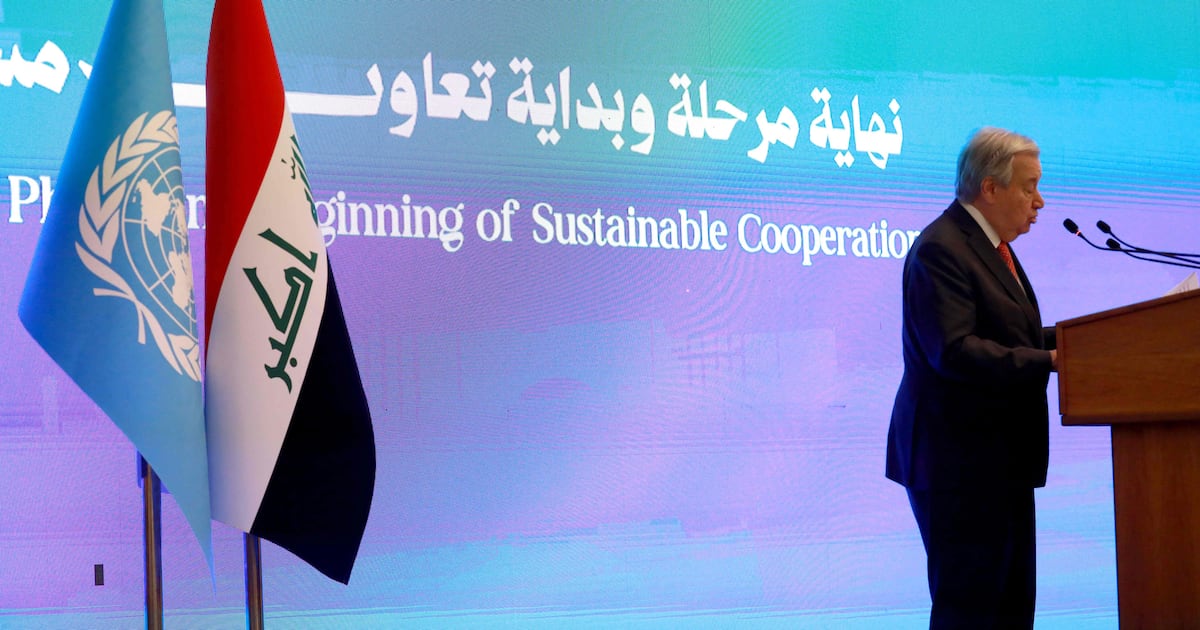Iraq assumes UN compound following mission closure

Tuesday, 02 January 2024 12:17 GMT
{var e=async t=>{await(await t())()};(self.Astro||(self.Astro={})).load=e;window.dispatchEvent(new Event(“astro:load”));})();]]>{var A=Object.defineProperty;var g=(i,o,a)=>o in i?A(i,o,{enumerable:!0,configurable:!0,writable:!0,value:a}):i[o]=a;var d=(i,o,a)=>g(i,typeof o!=”symbol”?o+””:o,a);{let i={0:t=>m(t),1:t=>a(t),2:t=>new RegExp(t),3:t=>new Date(t),4:t=>new Map(a(t)),5:t=>new Set(a(t)),6:t=>BigInt(t),7:t=>new URL(t),8:t=>new Uint8Array(t),9:t=>new Uint16Array(t),10:t=>new Uint32Array(t),11:t=>1/0*t},o=t=>{let[l,e]=t;return l in i?i[l](e):void 0},a=t=>t.map(o),m=t=>typeof t!=”object”||t===null?t:Object.fromEntries(Object.entries(t).map(([l,e])=>[l,o(e)]));class y extends HTMLElement{constructor(){super(…arguments);d(this,”Component”);d(this,”hydrator”);d(this,”hydrate”,async()=>{var b;if(!this.hydrator||!this.isConnected)return;let e=(b=this.parentElement)==null?void 0:b.closest(“astro-island[ssr]”);if(e){e.addEventListener(“astro:hydrate”,this.hydrate,{once:!0});return}let c=this.querySelectorAll(“astro-slot”),n={},h=this.querySelectorAll(“template[data-astro-template]”);for(let r of h){let s=r.closest(this.tagName);s!=null&&s.isSameNode(this)&&(n[r.getAttribute(“data-astro-template”)||”default”]=r.innerHTML,r.remove())}for(let r of c){let s=r.closest(this.tagName);s!=null&&s.isSameNode(this)&&(n[r.getAttribute(“name”)||”default”]=r.innerHTML)}let p;try{p=this.hasAttribute(“props”)?m(JSON.parse(this.getAttribute(“props”))):{}}catch(r){let s=this.getAttribute(“component-url”)||””,v=this.getAttribute(“component-export”);throw v&&(s+=` (export ${v})`),console.error(`[hydrate] Error parsing props for component ${s}`,this.getAttribute(“props”),r),r}let u;await this.hydrator(this)(this.Component,p,n,{client:this.getAttribute(“client”)}),this.removeAttribute(“ssr”),this.dispatchEvent(new CustomEvent(“astro:hydrate”))});d(this,”unmount”,()=>{this.isConnected||this.dispatchEvent(new CustomEvent(“astro:unmount”))})}disconnectedCallback(){document.removeEventListener(“astro:after-swap”,this.unmount),document.addEventListener(“astro:after-swap”,this.unmount,{once:!0})}connectedCallback(){if(!this.hasAttribute(“await-children”)||document.readyState===”interactive”||document.readyState===”complete”)this.childrenConnectedCallback();else{let e=()=>{document.removeEventListener(“DOMContentLoaded”,e),c.disconnect(),this.childrenConnectedCallback()},c=new MutationObserver(()=>{var n;((n=this.lastChild)==null?void 0:n.nodeType)===Node.COMMENT_NODE&&this.lastChild.nodeValue===”astro:end”&&(this.lastChild.remove(),e())});c.observe(this,{childList:!0}),document.addEventListener(“DOMContentLoaded”,e)}}async childrenConnectedCallback(){let e=this.getAttribute(“before-hydration-url”);e&&await import(e),this.start()}async start(){let e=JSON.parse(this.getAttribute(“opts”)),c=this.getAttribute(“client”);if(Astro[c]===void 0){window.addEventListener(`astro:${c}`,()=>this.start(),{once:!0});return}try{await Astro[c](async()=>{let n=this.getAttribute(“renderer-url”),[h,{default:p}]=await Promise.all([import(this.getAttribute(“component-url”)),n?import(n):()=>()=>{}]),u=this.getAttribute(“component-export”)||”default”;if(!u.includes(“.”))this.Component=h[u];else{this.Component=h;for(let f of u.split(“.”))this.Component=this.Component[f]}return this.hydrator=p,this.hydrate},e,this)}catch(n){console.error(`[astro-island] Error hydrating ${this.getAttribute(“component-url”)}`,n)}}attributeChangedCallback(){this.hydrate()}}d(y,”observedAttributes”,[“props”]),customElements.get(“astro-island”)||customElements.define(“astro-island”,y)}})();]]> 

403
Sorry!!
Error! We’re sorry, but the page you were looking for doesn’t exist.
 (MENAFN) Iraq officially took over the United Nations Integrated Compound in Baghdad on Saturday, marking the conclusion of the United Nations Assistance Mission for Iraq (UNAMI) at the end of 2025.
(MENAFN) Iraq officially took over the United Nations Integrated Compound in Baghdad on Saturday, marking the conclusion of the United Nations Assistance Mission for Iraq (UNAMI) at the end of 2025.
According to official statements, the handover document was signed by Iraq’s deputy foreign minister and the deputy special representative of the UN secretary-general. Both parties emphasized that the closure of the mission ushers in a new phase of development partnership, led by the UN country team in line with Iraq’s national priorities. Bahr Al-Uloom praised UNAMI’s “two-decade contribution to Iraq’s stability and development.”
The handover followed a high-level ceremony on December 13, 2025, attended by Iraqi and UN…
Continue reading












